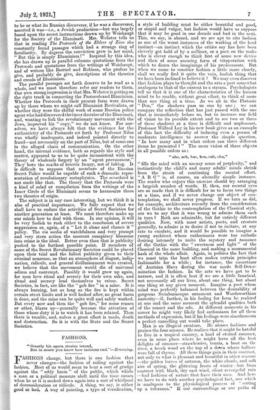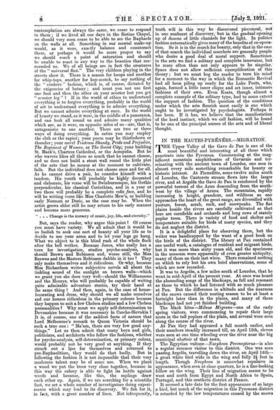FASHIONS.
"Greatly his opera strains intend,
But in music you know how fashions end."—Browning.
FASHIONS change, but there is one fashion that never changes—the fashion of railing against the fashion. Most of us would seem to bear a sort of grudge against the "eddy brain" of the public, which whirls ii man or a political measure aloft until the time comes when he or it is sucked down again into a sort of whirlpool of deconsideration or ridicule. A thing, we say, is either good or bad. A way of painting, a type of versification, a style of building must be either beautiful and good, or stupid and vulgar, but fashion would have us suppose that it may be good in one decade and bad in the next. This, we say, is absurd, and we are apt to cite fashion as one of the worst instances of the working of the herd instinct—an instinct which the critics say has here been cleverly got hold of by a milliner, or a poet on the make who is clever enough to think first of some new device and then of some amusing form of vituperation with which to damn the imaginings of his predecessors. But when we come to consider fashion a little more closely, shall we really find it quite the vain, foolish thing that we have been inclined to believe it ? We may even discover that fashion plays to thought and the arts a part somewhat analogous to that of the current to a stream. Psychologists tell us that it is one of the characteristics of the human mind to be unable, without great effort, to think of more than one thing at a time. As we sit in the Platonic "Den," the shadows pass us one by one ; we can compare the reflection that has just passed with the ono that is immediately before us, but to increase our field of vision to its possible extent and to see two or three of these shadows at a time is difficult and unpleasant. Professor Wilfred Lay in his new book gives as an example of this fact the difficulty of inducina° even a person of moderate intelligence to answer the simple question, "In how many and in what orders can three different items be presented?" The mere vision of three objects in all possible orders as :
" abc, acb, bac, boa, cab, cba,"
"fills the mind with an uneasy sense of perplexity," and instinctively the child's and many adults' minds shrink from the strain of continuing the mental effort. "A. B 0" is, of course, an absurdly simple instance. The reader who enjoys this exercise should try arranging a largeish number of words. If, then, our mental eyes are so made that it is difficult for us to focus two things at a time, and if we never change our object of con- templation we shall never progress. If we turn as did, for example, architecture recently from the consideration of the Gothic to the contemplation of the Classical style, are we to say that it was wrong to admire them each in turn ? Both are admirable, but for entirely different qualities. Now, with most artists, poets, and creators generally, to admire is to desire if not to imitate, at any rate to emulate, and it would be possible to imagine a young architect whose enthusiasms were too catholic desiring intensely to unite the mystery and romance of the Gothic with the "sweetness and light" of the Classical in the same building, and making a monumental hash of the whole affair. Again, in politics the, fact that we must trim the boat often makes certain principles fashionable for a while ; for instance, the executions of Austrian Slays during the war made Self-Deter- mination the fashion. In the arts we have got to be narrow, and it is often best if we are a little fanatical, not necessarily all our lives, about one thing, but about one thing at any given moment. Imagine a poet whose mind was perfectly balanced between the desirability of gorgeous Swinburnesque ornament and Wordsworthian austerity—if, further, in his feeling for form he realized at one and the same moment the splendid qualities both of the sonnet and the ode. At different moments in his career he might very likely feel enthusiasm for all these methods of expression, but if his feelings were simultaneous a perfect cancelling out would take place. Man is an illogical creature. He abuses fashions and praises the four seasons. He realizes that it might be hateful to live in a tropical country, a land of eternal summer, even in some place where he might have all the best delights of summer—strawberries, tennis, a boat on thc river, a beech wood on the top of a down whose hollow. were full of thyme. All these things gain in their contrast, not only to what is pleasant and beautiful in other seasons —the golden leaves of autumn, the white clouds, and soft airs of spring, the glittering frosts of winter—but from contrast with black, dry east wind, silent revengeful rain —bad fashions of nature that have their uses. And here we have to do with another psychological fact, one which is analogous to the physiological process of "setting up a tolerance." If our surroundings or our paths of contemplation are always the same, we cease to respond Lo them ; if we lived all our days in the Sistine Chapel, we should very soon cease to be able to see the Raphaels on the walls at all. Something 'in our mental make-up would, as it were, exactly balance and counteract them, or perhaps it would be more proper to say we should reach a point of saturation and should be unable to react in any way to the beauties that sur- rounded us. We of all beings are in fact the creatures of the "universal flux." The very children playing in the streets show it. There is a season for hoops and another for whip-tops, another for hop-scotch, to say nothing of the " conkers " fashion, which is, of course, dictated by the exigencies of botany • and must you not use first one foot and then the other oh your scooter lest you get "scooter leg" ? If in the world of ethics to understand everything is to forgive everything, probably in the world of art to understand everything is to admire everything. But we cannot admire everything at once. In the world of beauty we stand, as it were, in the middle of a panorama, and can look all round us and admire many qualities which are, as it were, on opposite sides of us—are, that is, antagonistic to one another. There are two or three ways of doing everything. In satire you may employ the club or the rapier; your poem may be thistledown or thunder; your novel Tristram Shandy, Pride and Prejudice, The Regiment of Women, or The Secret City; your building Bt. Mark's, Chartres Cathedral, or the Acropolis. But he who wavers likes all these so much that he cannot choose, and so does not build a stout wall round the little plot of the arts that he means at the moment to cultivate, fails. But the individual does not choose once and for all. As he cannot drive a pair, he consoles himself with a tandem. His youth will probably be highly decorated and elaborate, his verse will be Swinburnesque, his Gothic perpendicular, his classical Corinthian, and in a year or two there will probably be a complete volte face, and he will be writing verse like Miss Charlotte Mew's, or building early Norman or Doris, as the case may be. When the artist grows older still he may return to his early manner and become more generous.
. . . Change is the nursery of music, joy, life, and eternity."
But, says the reader, why argue this point ? Of course you must have variety. We all admit that it would be as foolish to seek one sort of beauty all your life as to decide to use your arms and to let your legs go hang. What we object to is this blind rush of the whole flock after the bell wether. Because Jones, who really has a turn for investigation, studies psycho-analysis, why should Brown and Robinson and, worse still, the Miss Browns and the Masters Robinson dabble in it too ? They only make themselves and it ridiculous. Or•why, because Miss Richardson writes subjective novels all about the tinkling sound of the sunlight on brown walls—which we grant you she does very well—should the Williamsons and the Henrys, who will probably be capable of writing quite , admirable adventure stories, try their hand at the same thing ? And then, again, in the case of house- decorating and dress, why should we all make ourselves and our houses ridiculous in the primary colours because they happen to suit a few Chelsea studios and a few Chelsea personalities ? Why must we apply sell-determination to Devonshire because it was necessary in Czecho-Slovakia ? It is, of course, one of the saddest facts of nature that Lord Melbourne's remark to Queen Victoria should be such a true one "Ma'am,, there are very few good any- things." Let us then admit that many boys and girls, politicians, and architects who follow the fashions, whether for psycho-analysis, self-determination, or primary colour, would probably not be very good at anything. If they struck out a line for themselves and returned to pre-Raphaelitism, they would do that badly. But in following the fashion it is not impossible that their very moderate talent may be of some use. When we plant a wood we put the trees very close together, because in this way the colony is able to fight its battle against weeds and because, like this, the saplings draw each other up. Again, if we are searching for a scientific fact, we set a whole number of investigators doing experi- ments which may lead to its discovery. We fish for it, in fact, with a great number of lines. Not infrequently, ti truth -will in this way be . discovered piecemeal, not in one sunburst of discovery, but in. the gradual opening up of dozens of little channels for the light. In politic& fashion automatically gives many of the benefits of co-opera- tion. So it is in the search for beauty, only that in the case of that search the individual searchers are generally people who desire a good deal of moral support. Sometimes. in the arts we find a solitary and complete innovator, but he more often than not only appears to be singular. ' Space does not allow .sufficient exemplification of this theory ; but we must beg the reader to turn his mind for a moment to the way in which the Romantic Revival had all been piling up ready for the Lake Poets, who, - again, formed a little inner clique and set inner, intimate fashions of their own. Even Keats, though almost a complete example of the solitary type, had to some extent the support of fashion. The question of the conditions under which the arts flourish most easily is one which ought to be investigated by psychologists. Perhaps it has been. If it has, we believe that the manifestation of the herd instinct, which we call fashion, will be found to be one of the principal nurses of the arts and of liberal thought.











































 Previous page
Previous page